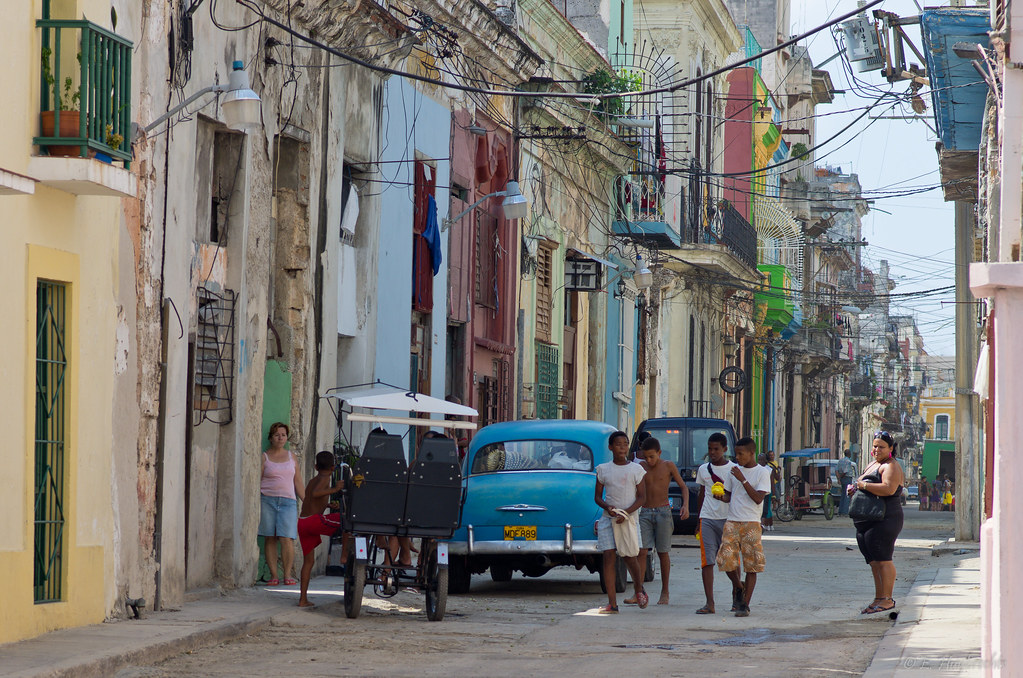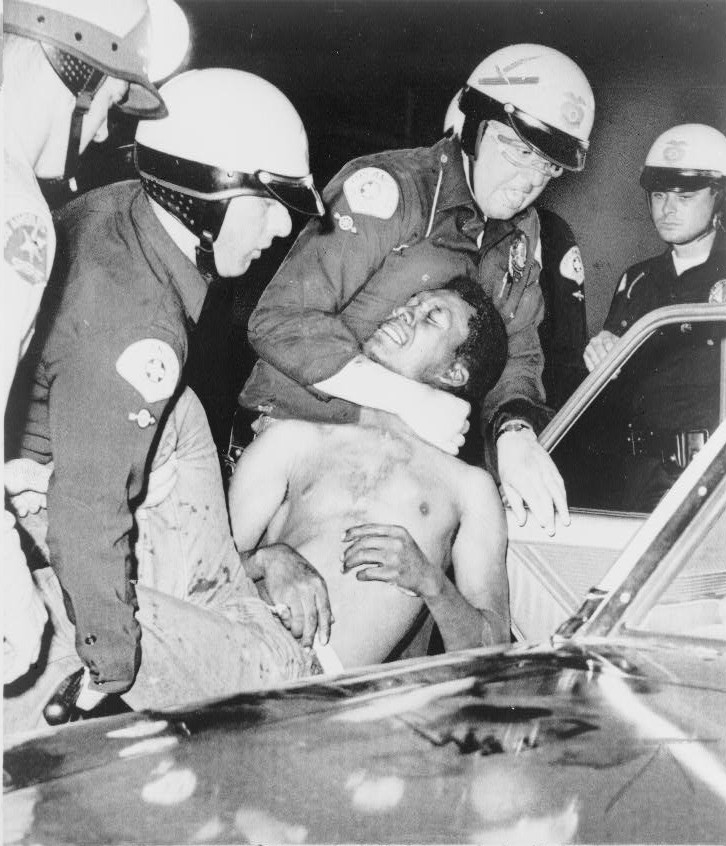The Cuban American Cha-Cha
Today President Obama gave a historic speech from Havana, Cuba, outlining his vision for a rapprochement between Cuba and the USA. I found it inspiring but a little disingenuous, especially at the end. These types of speeches, meant to demark some historical significance, are writ large, with sonorous phrases and appeals to “our better angels.” But we cannot let it lie there, shining like some fable from the George Washington cherry tree notebook; it needs to be examined for its true nature.
I have left the first half of the speech to history. It was a wonderful display of reconciliation, a reaching out to the Cuban people in a way that might well soften their hearts to American interests.
The last half, however, tended to twist the narrative toward fantasy, in a way that Reagan would have been proud. Here are the more unsettling paragraphs:
So let me tell you what I believe. I can't force you to agree, but you should know what I think. I believe that every person should be equal under the law. (Applause.) Every child deserves the dignity that comes with education, and health care and food on the table and a roof over their heads. (Applause.) I believe citizens should be free to speak their mind without fear -- (applause) -- to organize, and to criticize their government, and to protest peacefully, and that the rule of law should not include arbitrary detentions of people who exercise those rights. (Applause.) I believe that every person should have the freedom to practice their faith peacefully and publicly. (Applause.) And, yes, I believe voters should be able to choose their governments in free and democratic elections. (Applause.)
Now as to what Obama really thinks for himself we don’t know, but here we can simply take him at his word. He doesn’t say explicitly that he feels that in the US these beliefs, these ideals, have been achieved, but it does sound to me that he is comparing a despotic government which lacks these ideals (Cuba) with one that has indeed achieved them (USA).
But in the USA every child has not achieved the dignity that comes with education. Far from it. We are a nation of classes, and if you are wealthy you can achieve great things. If you are poor you likely endure a system of unequal education. As for health care and food on the table, and shelter, the US is the exemplar of inequality. People go bankrupt because they get diabetes or have a stroke or heart attack. The US was quick to bail out banks that took the roof quite literally away from those in the poorer levels of society, and even the middle classes.
When speaking their minds workers within the US government had better fear for their livelihood and in some cases for their freedom, as Robert McCarthy, Joshua Wilson, Chelsea Manning, Carmen Segarra, Edward Snowden, David P. Weber, Ben Strickland, J. Kirk McGill, John Bitterman, and others have recently experienced. Are they not political prisoners of a kind? Those who have wished to protest peacefully have often been met with force and tear gas and pepper spray.
And in the USA do we choose our governments in free democratic elections, or do the officials choose their voters with corrupt gerrymandering techniques? And do they ignore the constituency in favor of big monied interests? Don’t they simply vote on bills that lobbyists have placed in front of them? Is this what we want to call democracy?
Not everybody agrees with me on this. Not everybody agrees with the American people on this. But I believe those human rights are universal. (Applause.) I believe they are the rights of the American people, the Cuban people, and people around the world.
Now, there’s no secret that our governments disagree on many of these issues. I’ve had frank conversations with President Castro. For many years, he has pointed out the flaws in the American system -- economic inequality; the death penalty; racial discrimination; wars abroad. That’s just a sample. He has a much longer list. (Laughter.) But here’s what the Cuban people need to understand: I welcome this open debate and dialogue. It’s good. It’s healthy. I’m not afraid of it.
I’m sure he does have a longer list. It probably includes the waging of an illegal, immoral war in Nicaragua and El Salvador and he might have mentioned the genocide in Guatemala that Reagan helped perpetuate. As well, he probably remembers the US making Central and South America the playground for Kissinger’s political games, games which cost the lives of countless people.
We do have too much money in American politics. But, in America, it's still possible for somebody like me -- a child who was raised by a single mom, a child of mixed race who did not have a lot of money -- to pursue and achieve the highest office in the land. That's what’s possible in America. (Applause.)
It’s possible, yes. But is it possible for someone like Obama, raised by a single mother, with dark skin, with a history of living in a Muslim country to achieve such high rank without the support of big money in Wall Street and elsewhere? No, I don’t think so.
We do have challenges with racial bias -- in our communities, in our criminal justice system, in our society -- the legacy of slavery and segregation. But the fact that we have open debates within America’s own democracy is what allows us to get better. In 1959, the year that my father moved to America, it was illegal for him to marry my mother, who was white, in many American states. When I first started school, we were still struggling to desegregate schools across the American South. But people organized; they protested; they debated these issues; they challenged government officials. And because of those protests, and because of those debates, and because of popular mobilization, I’m able to stand here today as an African-American and as President of the United States. That was because of the freedoms that were afforded in the United States that we were able to bring about change.
I think he would have been better to emphasize the great cost that has accrued from those changes, changes that killed so many, changes that cost people their futures. Debate and protest in the US are not met with kindness; they are met with fury.
I’m not saying this is easy. There’s still enormous problems in our society. But democracy is the way that we solve them. That's how we got health care for more of our people. That's how we made enormous gains in women’s rights and gay rights. That's how we address the inequality that concentrates so much wealth at the top of our society. Because workers can organize and ordinary people have a voice, American democracy has given our people the opportunity to pursue their dreams and enjoy a high standard of living. (Applause.)
It has to be emphasized that in the US we still have tens of millions without any health care. Obama uses the ACA as a point of pride. It is nothing but a slight sliver of hope. And if we truly are not a real democracy --and we are not-- his argument that this is how we address our inequality is nothing but blather. Worker unions in the US are being decimated. Corporations have won the right to rule their laborers by legislation, twisting the arms of their politician minions to pass so-called “Right to Work” laws, which are nothing but an excuse to fire at will anyone who does not toe the corporate line.
Now, there are still some tough fights. It isn’t always pretty, the process of democracy. It's often frustrating. You can see that in the election going on back home. But just stop and consider this fact about the American campaign that's taking place right now. You had two Cuban Americans in the Republican Party, running against the legacy of a black man who is President, while arguing that they’re the best person to beat the Democratic nominee who will either be a woman or a Democratic Socialist. (Laughter and applause.) Who would have believed that back in 1959? That's a measure of our progress as a democracy. (Applause.)
So here’s my message to the Cuban government and the Cuban people: The ideals that are the starting point for every revolution -- America’s revolution, Cuba’s revolution, the liberation movements around the world -- those ideals find their truest expression, I believe, in democracy. Not because American democracy is perfect, but precisely because we’re not. And we -- like every country -- need the space that democracy gives us to change. It gives individuals the capacity to be catalysts to think in new ways, and to reimagine how our society should be, and to make them better.
There’s already an evolution taking place inside of Cuba, a generational change. Many suggested that I come here and ask the people of Cuba to tear something down -- but I’m appealing to the young people of Cuba who will lift something up, build something new. (Applause.) El future de Cuba tiene que estar en las manos del pueblo Cubano. (Applause.)
The future of Cuba must be in the hands of Cubans and the future of America must be likewise in the hands of Americans...which is to say the future is bleak, since American democracy is an illusion, and the Cuban dictatorship is statist.
And to President Castro -- who I appreciate being here today -- I want you to know, I believe my visit here demonstrates you do not need to fear a threat from the United States. And given your commitment to Cuba’s sovereignty and self-determination, I am also confident that you need not fear the different voices of the Cuban people -- and their capacity to speak, and assemble, and vote for their leaders. In fact, I’m hopeful for the future because I trust that the Cuban people will make the right decisions.
And as you do, I’m also confident that Cuba can continue to play an important role in the hemisphere and around the globe -- and my hope is, is that you can do so as a partner with the United States.
We’ve played very different roles in the world. But no one should deny the service that thousands of Cuban doctors have delivered for the poor and suffering. (Applause.) Last year, American health care workers -- and the U.S. military -- worked side-by-side with Cubans to save lives and stamp out Ebola in West Africa. I believe that we should continue that kind of cooperation in other countries.
We’ve been on the different side of so many conflicts in the Americas. But today, Americans and Cubans are sitting together at the negotiating table, and we are helping the Colombian people resolve a civil war that’s dragged on for decades. (Applause.) That kind of cooperation is good for everybody. It gives everyone in this hemisphere hope.
It is not the American government that Castro needs to fear; it is the corporate junta behind that government, writing its laws, forming its future.
We took different journeys to our support for the people of South Africa in ending apartheid. But President Castro and I could both be there in Johannesburg to pay tribute to the legacy of the great Nelson Mandela. (Applause.) And in examining his life and his words, I'm sure we both realize we have more work to do to promote equality in our own countries -- to reduce discrimination based on race in our own countries. And in Cuba, we want our engagement to help lift up the Cubans who are of African descent -- (applause) -- who’ve proven that there’s nothing they cannot achieve when given the chance.
We’ve been a part of different blocs of nations in the hemisphere, and we will continue to have profound differences about how to promote peace, security, opportunity, and human rights. But as we normalize our relations, I believe it can help foster a greater sense of unity in the Americas -- todos somos Americanos. (Applause.)
...
There is more than just “more work to do to promote equality.” America is accelerating its inequality, veering into uncharted territory. The work this nation is doing is not to undo inequality, but to make that inequality permanent. A Cuba that enters into a relationship with this behemoth of corporate mis-union has much to fear. Promotion of peace has not been a hallmark of this nation, not even from the presidents who have managed to win Nobel Peace prizes. Human rights have been discounted by those committing torture and by the bombing of civilians, by the constant waging of war. By imprisonment without just cause and without the rule of law.
These two countries have danced a little like children trying to be adults, pretending to know how the music is played. But when the lives of so many are at stake, when everyone depends so much on the telling of truths, now it is better to remember the How of our history, and the real Why. We should not pretend anymore. A new song may well be played next, but we don’t need to hear it to know how dangerous it is to pretend.




Comments